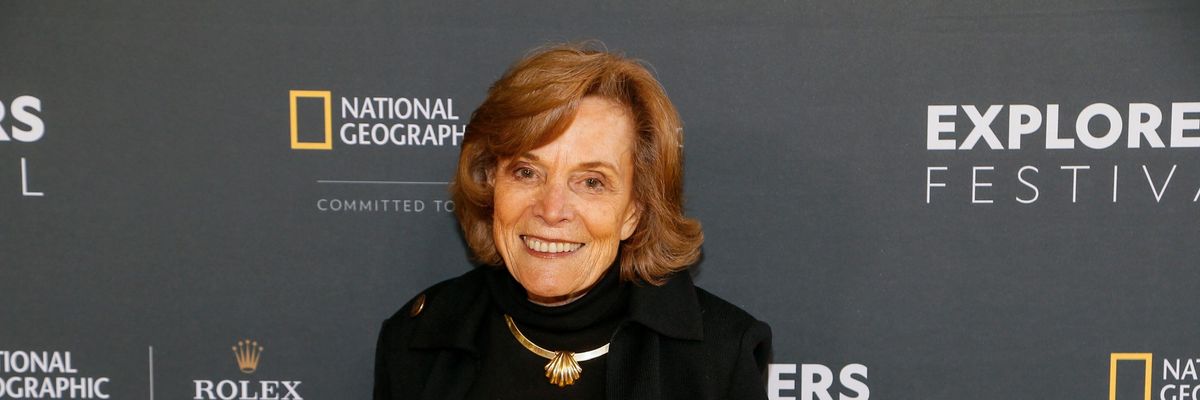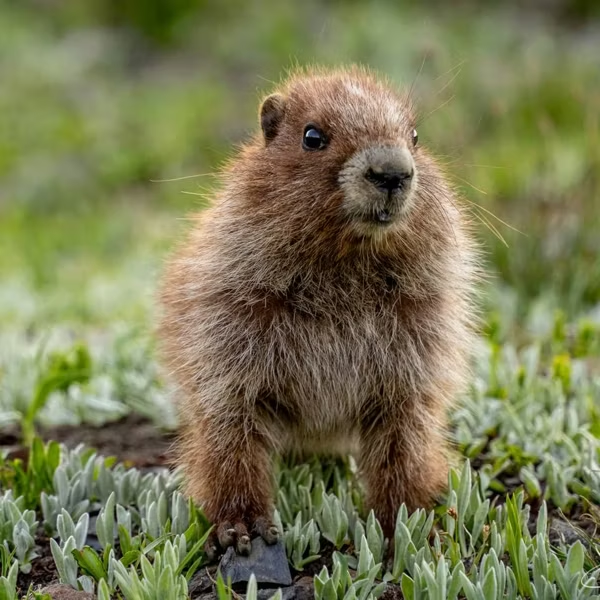
National Geographic Explorer-at-Large Sylvia Earle attends the National Geographic Awards on June 12, 2019, at Lisner Auditorium in Washington, D.C. (Photo: Paul Morigi/Getty Images for National Geographic)
Industrial Fishing Ban Needed, Says Renowned Ocean Defender Sylvia Earle
"All of that wildlife taken out of the ocean not only affects biodiversity and fosters extinctions at an accelerated rate. It breaks the carbon cycle—the nutrient chain that maintains the fabric of life on Earth."
Renowned oceanographer Sylvia Earle is calling for world leaders at the United Nations climate summit to support a ban on industrial fishing in international waters to "safeguard the blue heart of the planet."
"We must protect nature as if our lives depend on it."
"All of that wildlife taken out of the ocean not only affects biodiversity and fosters extinctions at an accelerated rate. It breaks the carbon cycle--the nutrient chain that maintains the fabric of life on Earth," said Earle, who was at COP26 this week, The Guardian reported Wednesday.
The deep-sea researcher said tackling the issue of overfishing is as important to the climate crisis as curbing fossil fuel emissions. A industrial fishing ban, said Earle, would help protect oceans "in a stroke."
Due to poor management and regulation, overfishing occurs when fish species are removed from the ocean at such high rates they become too depleted to recover, destroying fish populations around the world. Commercial fishing also employs tactics that perpetuate unnecessary waste, when massive amounts of unwanted fish and animals are caught in nets and then discarded.
According to a 2018 report by the U.N. Food and Agriculture Organization, a third of commercial fish populations are being harvested at biologically unsustainable levels and the world's fisheries are in deep trouble.
While three billion people worldwide rely on wild-caught or farmed seafood as a food source, Earle noted that just five nations were "benefiting disproportionately on an industrial scale from the wild animals that live [in international waters]," for means of profit. Earle argued that the coastal communities who survived on fishing could do so within national waters.
Eighty-six-year-old Earle, president of Mission Blue, an organization that aims to establish marine protected areas (MPAs), welcomed COP26's "30x30" initiative to secure at least 30% of world's oceans by 2030, but says the proposal does not go far enough.
"We must protect nature as if our lives depend on it," she said. "Achieving 30% of full protection for land and sea... doesn't mean we can trash the rest."
An Urgent Message From Our Co-Founder
Dear Common Dreams reader, The U.S. is on a fast track to authoritarianism like nothing I've ever seen. Meanwhile, corporate news outlets are utterly capitulating to Trump, twisting their coverage to avoid drawing his ire while lining up to stuff cash in his pockets. That's why I believe that Common Dreams is doing the best and most consequential reporting that we've ever done. Our small but mighty team is a progressive reporting powerhouse, covering the news every day that the corporate media never will. Our mission has always been simple: To inform. To inspire. And to ignite change for the common good. Now here's the key piece that I want all our readers to understand: None of this would be possible without your financial support. That's not just some fundraising cliche. It's the absolute and literal truth. We don't accept corporate advertising and never will. We don't have a paywall because we don't think people should be blocked from critical news based on their ability to pay. Everything we do is funded by the donations of readers like you. Will you donate now to help power the nonprofit, independent reporting of Common Dreams? Thank you for being a vital member of our community. Together, we can keep independent journalism alive when it’s needed most. - Craig Brown, Co-founder |
Renowned oceanographer Sylvia Earle is calling for world leaders at the United Nations climate summit to support a ban on industrial fishing in international waters to "safeguard the blue heart of the planet."
"We must protect nature as if our lives depend on it."
"All of that wildlife taken out of the ocean not only affects biodiversity and fosters extinctions at an accelerated rate. It breaks the carbon cycle--the nutrient chain that maintains the fabric of life on Earth," said Earle, who was at COP26 this week, The Guardian reported Wednesday.
The deep-sea researcher said tackling the issue of overfishing is as important to the climate crisis as curbing fossil fuel emissions. A industrial fishing ban, said Earle, would help protect oceans "in a stroke."
Due to poor management and regulation, overfishing occurs when fish species are removed from the ocean at such high rates they become too depleted to recover, destroying fish populations around the world. Commercial fishing also employs tactics that perpetuate unnecessary waste, when massive amounts of unwanted fish and animals are caught in nets and then discarded.
According to a 2018 report by the U.N. Food and Agriculture Organization, a third of commercial fish populations are being harvested at biologically unsustainable levels and the world's fisheries are in deep trouble.
While three billion people worldwide rely on wild-caught or farmed seafood as a food source, Earle noted that just five nations were "benefiting disproportionately on an industrial scale from the wild animals that live [in international waters]," for means of profit. Earle argued that the coastal communities who survived on fishing could do so within national waters.
Eighty-six-year-old Earle, president of Mission Blue, an organization that aims to establish marine protected areas (MPAs), welcomed COP26's "30x30" initiative to secure at least 30% of world's oceans by 2030, but says the proposal does not go far enough.
"We must protect nature as if our lives depend on it," she said. "Achieving 30% of full protection for land and sea... doesn't mean we can trash the rest."
Renowned oceanographer Sylvia Earle is calling for world leaders at the United Nations climate summit to support a ban on industrial fishing in international waters to "safeguard the blue heart of the planet."
"We must protect nature as if our lives depend on it."
"All of that wildlife taken out of the ocean not only affects biodiversity and fosters extinctions at an accelerated rate. It breaks the carbon cycle--the nutrient chain that maintains the fabric of life on Earth," said Earle, who was at COP26 this week, The Guardian reported Wednesday.
The deep-sea researcher said tackling the issue of overfishing is as important to the climate crisis as curbing fossil fuel emissions. A industrial fishing ban, said Earle, would help protect oceans "in a stroke."
Due to poor management and regulation, overfishing occurs when fish species are removed from the ocean at such high rates they become too depleted to recover, destroying fish populations around the world. Commercial fishing also employs tactics that perpetuate unnecessary waste, when massive amounts of unwanted fish and animals are caught in nets and then discarded.
According to a 2018 report by the U.N. Food and Agriculture Organization, a third of commercial fish populations are being harvested at biologically unsustainable levels and the world's fisheries are in deep trouble.
While three billion people worldwide rely on wild-caught or farmed seafood as a food source, Earle noted that just five nations were "benefiting disproportionately on an industrial scale from the wild animals that live [in international waters]," for means of profit. Earle argued that the coastal communities who survived on fishing could do so within national waters.
Eighty-six-year-old Earle, president of Mission Blue, an organization that aims to establish marine protected areas (MPAs), welcomed COP26's "30x30" initiative to secure at least 30% of world's oceans by 2030, but says the proposal does not go far enough.
"We must protect nature as if our lives depend on it," she said. "Achieving 30% of full protection for land and sea... doesn't mean we can trash the rest."

